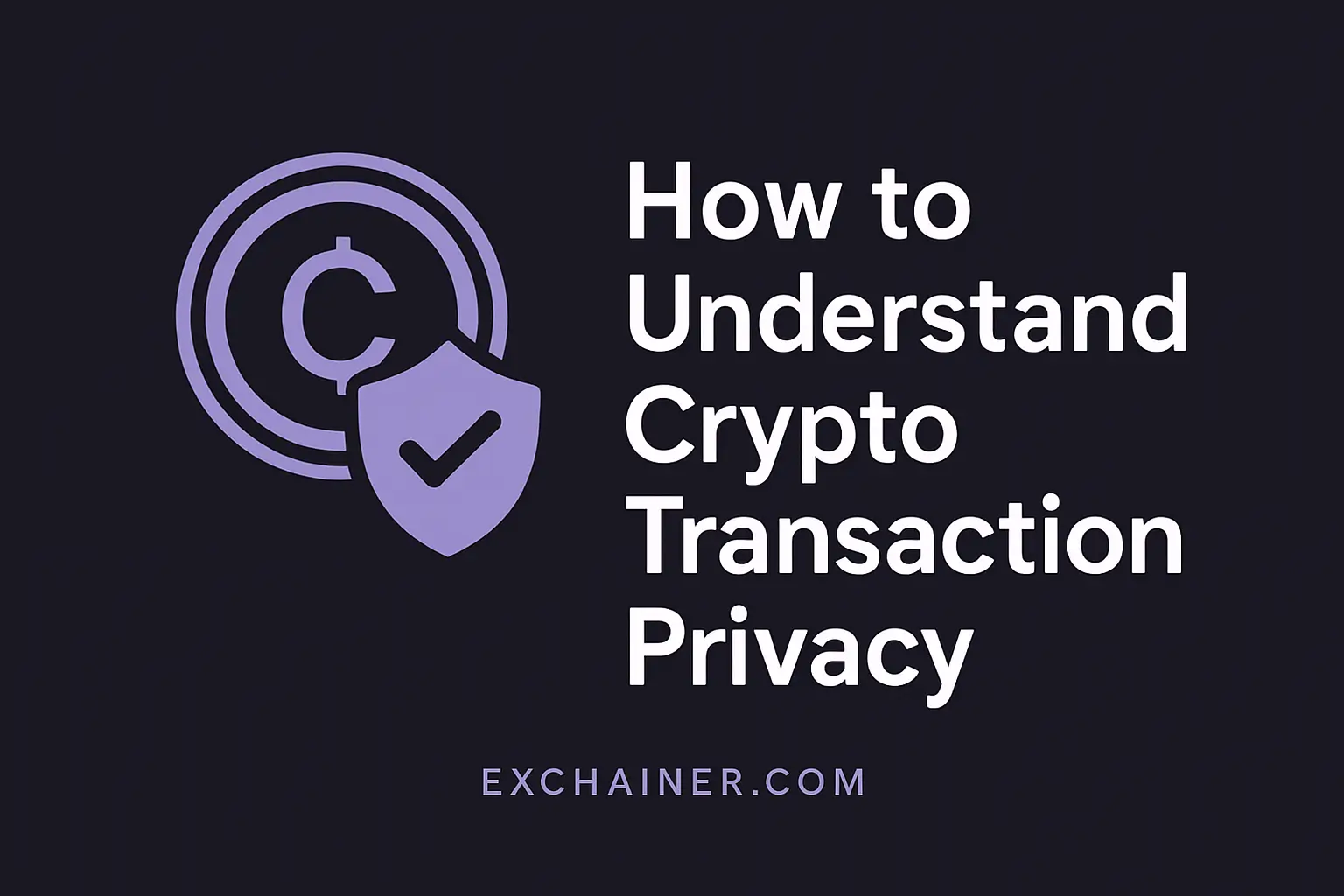Friends, diving into the world of cryptocurrency is exciting and full of opportunities, but it can also feel like entering a labyrinth. One of the key aspects that often puzzles many newcomers and even intermediate users is transaction privacy. Why does it matter? How private are your crypto transactions really? And what tools or practices can enhance this privacy? Whether you’re sending Bitcoin to a friend or trading on decentralized exchanges, understanding transaction privacy is essential for protecting your financial freedom and security in this digital age.
In this guide, we’ll explore the concept of transaction privacy in crypto explained simply. You’ll learn how digital currency transactions work, what information they reveal, and why some people care deeply about concealing that data. By the end of this article, you will not only grasp the basics but have practical tips and resources to keep your crypto activities more confidential, without getting lost in technical jargon. Ready to unravel the mysteries behind crypto privacy? Let’s get started.
What Is Transaction Privacy in Cryptocurrency?
At its core, transaction privacy refers to the ability to keep details of your cryptocurrency transactions—such as the amount, sender, receiver, or transaction history—hidden or obscured from public view. This is important because most popular cryptocurrencies, including Bitcoin and Ethereum, operate on transparent blockchains where every transaction is publicly recorded and viewable by anyone.
Think of it this way: cryptocurrency transactions are like writing a check that anyone can read, copy, or analyze. While your name may not be on the check, your wallet’s public address acts like a pseudonym visible to the entire world. Over time, anyone can piece together your transaction patterns, spending habits, and even trace who you’re paying.
Why does that matter? Because financial privacy is a fundamental human right to many, and in some cases, it is about safety—avoiding hacks, thefts, or even intrusive governments or third parties monitoring your moves. Transaction privacy helps maintain autonomy, security, and freedom in the crypto ecosystem.
Public vs Private Blockchains
Most cryptocurrencies run on public blockchains where data is open and transparent. Every transaction is stored permanently and accessible. Bitcoin is the classic example.
On the other hand, some blockchains prioritize privacy and security. These privacy coins like Monero, Zcash, and Dash introduce technology that keeps transaction details hidden or encrypted, allowing users to send funds discreetly.
Understanding which blockchain you’re dealing with is crucial when considering how much privacy your transactions have.
How Do Crypto Transactions Work and What Makes Them Transparent?
If you’ve ever sent or received cryptocurrency, you might have noticed terms like “public address,” “transaction ID,” and “block confirmations.” Here’s a simple breakdown of what happens behind the scenes:
When you send crypto, your wallet creates a transaction packet containing the sender’s and receiver’s public addresses, the amount of crypto, transaction fees paid to miners or validators, and a digital signature proving ownership. This packet is broadcasted to the network and then recorded permanently on the blockchain.
Because blockchains are distributed ledgers, anyone with internet access can explore these transactions using blockchain explorers — websites that allow you to search transactions by wallet addresses or transaction IDs.
This mechanism is why crypto transactions are often called “pseudonymous.” Although your identity isn’t directly linked to your wallet on the ledger, anyone who knows your wallet addresses can track and analyze your transaction history.
Example: Blockchain Explorers and Transparency
Imagine Alice sends 1 Bitcoin to Bob. Alice’s wallet address and Bob’s receiving address, the exact amount, and the time of transaction are all visible on block explorers like Blockchain.com Explorer or Etherscan for Ethereum transactions. Anyone can pull up this transaction and check where that Bitcoin is moving next.
This level of transparency is fantastic for auditability and trustless verification, but it’s not great if you want your spending or investments to stay confidential.
Methods and Technologies to Enhance Transaction Privacy
Don’t worry! The crypto ecosystem isn’t blind to privacy concerns. Over the years, developers and users have come up with multiple ways to enhance transaction privacy without compromising security.
1. Using Privacy Coins
Privacy coins such as Monero (XMR) use complex cryptography like ring signatures, stealth addresses, and confidential transactions that hide who sent what to whom and how much. For instance, ring signatures mix your transaction details with those of several others, making it nearly impossible to trace the path of funds.
Pros: High privacy, widely trusted in privacy-focused community.
Cons: Some exchanges restrict trading due to regulatory concerns.
2. CoinJoin and Mixing Services
If you mainly use Bitcoin or Ethereum and want better privacy, you can use mixers or CoinJoin services. CoinJoin combines multiple users’ transactions into one big transaction, mixing their inputs and outputs. This blurs the connection between sender and receiver addresses.
Popular CoinJoin implementations include Samourai Wallet’s Whirlpool and Wasabi Wallet.
Important note: Avoid suspicious mixers or free services that can steal your funds or expose your data. Always use reputable and open-source solutions.
3. Layer 2 Solutions and Private Channels
Layer 2 protocols like the Lightning Network allow off-chain transactions between parties through payment channels. Since these transactions don’t get recorded individually on the blockchain, they offer enhanced privacy and faster speeds.
4. Using Decentralized Exchanges (DEX) with Privacy Features
Decentralized exchanges like Uniswap or Kyber Network offer more privacy by not requiring extensive personal information for trading. Some emerging projects are integrating zk-SNARKs or zk-Rollups—advanced cryptographic techniques—to improve user anonymity during trading.
Practical Tips to Protect Your Transaction Privacy
Even when using transparent blockchains like Bitcoin, there are simple steps you can take to enhance your crypto privacy:
1. Generate New Addresses for Every Transaction
Avoid using the same wallet address repeatedly. Most wallets support this feature and can generate new public addresses, preventing easy linkage between your transactions.
2. Avoid Sharing Your Wallet Address Publicly
Sharing your wallet on social media or forums makes it easy to correlate your identity with your transaction history.
3. Use Privacy-Focused Wallets
Wallets such as Monero’s official wallet or Wasabi Wallet allow better privacy controls and CoinJoin integration.
4. Limit On-Chain Transactions
Whenever possible, use Layer 2 solutions or off-chain transfers to minimize the number of visible transactions on the blockchain.
5. Beware of KYC and Exchange Data
Know that centralized exchanges performing KYC (Know Your Customer) keep records of your personal information linked to your trades and withdrawals. Using decentralized exchanges can minimize this exposure but often require more technical know-how.
Remember, absolute privacy is difficult to guarantee, but these habits can dramatically improve your transaction confidentiality.
Why Does Transaction Privacy Matter in the Real World?
Many ask, “If blockchain is transparent, why even care about transaction privacy?” Let’s look at a few reasons:
1. Financial Security and Safety
Revealing your transaction history can expose your wealth, making you a target for hackers, scammers, or physical threats.
2. Preventing Unwanted Surveillance
Governments, data brokers, or malicious actors can track spending habits, leading to censorship, discrimination, or abuse.
3. Protecting Business Confidentiality
Companies using blockchain for payments want to keep their operational secrets out of competitors’ hands.
4. Upholding Financial Freedom
Privacy is central to economic freedom. It ensures your transactions remain your business and nobody else’s.
As the great cryptographer Bruce Schneier once said: “Privacy is not about hiding from the government, it’s about controlling the flow of information about you.” In crypto, transaction privacy is your control switch.
Conclusion
Friends, navigating transaction privacy in cryptocurrency may initially seem complex, but it’s accessible once you break it down. You’ve learned that while most crypto transactions are transparent by design, many tools and strategies can boost your privacy—from privacy coins to CoinJoin mixers, Layer 2 solutions, and mindful habits with wallet usage.
Understanding transaction privacy enhances not only your security but also your confidence in managing digital currency. Crypto offers immense freedom, but with that freedom comes the responsibility to protect your data and finances.
Ready to deepen your crypto knowledge? Check out our beginner-friendly resources at Crypto 101, browse top platforms with reliable reviews in our Exchange Reviews, and discover powerful tools to safeguard your assets at our Tools and Wallets section.
Take charge of your crypto journey today and make privacy your priority. After all, in the words of Edward Snowden: “Arguing that you don’t care about privacy because you have nothing to hide is no different than saying you don’t care about free speech because you have nothing to say.” Stay safe, stay smart!












